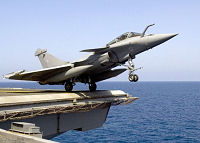Jan
28
If France Can Do It . . .
 Posted by Clif Burns at 5:49 pm on January 28, 2009
Posted by Clif Burns at 5:49 pm on January 28, 2009
 Category: DDTC
Category: DDTC
 ABOVE:French Rafale M Fighter Jet
ABOVE:French Rafale M Fighter Jet
An article that appeared today on the website of the German-based Defence Professionals group reported on an address given last week by French Defense Minister Hervé Morin. Mr. Morin optimistically predicted that France would surpass Britain this year as Europe’s largest weapons exporter and added that French weapons exports in 2010 could reach $9 billion.
This part of Morin’s address, as reported, particularly caught my attention:
In his statement, Morin also pointed out that defence acquisitions are a political issue that have to be supported by a country’s politicians. “A country’s purchasing decisions depend on the quality of the product and the product’s price, but it is also a political act. There has to be both: industrial and political. If one is missing, our position is weakened,” he said.
In this context, the French government has undertaken a reform of export procedures with the result being that export license applications now can be processed in less than 40 days, compared previously with 80 days and created a high-level arms sale task force with the aim to help the defence industry to better trade their products.
(Emphasis added.)
While skeptics and Francophobes might suspect that this reduction in license processing times might simply reflect a decision to process licenses less carefully, I think that would be unfair. But whatever your position on how the reduction was accomplished, everyone can certainly agree that more streamlined procedures in processing U.S. export licenses for defense articles could be a significant benefit for the U.S. defense industry.
 Permalink
Permalink
Copyright © 2009 Clif Burns. All Rights Reserved.
(No republication, syndication or use permitted without my consent.)
2 Comments:

Agreed. Although I think DTCL should get a lot of credit for improvements that I–and probably other folks, too–have already seen over the past year or so. State approvals now generally come through more quickly than Commerce approvals, in our experience. We frequently get even non-OIF/OEF DSP-5s back in about two or three weeks. TAAs tend to run just a week or two longer.
Plus, and perhaps just as importantly, the licensing staff at DTCL are now significantly more helpful and responsive. We no longer live in mortal fear of RWAs being issued because of minor oversights or ambiguities in our applications. We now get actual phone calls from licensing officers with questions. All sarcasm aside, this is an outstanding improvement.
At a certain point, though, DTCL’s reforms will reach the point of diminishing returns, largely because of the requirement to staff so many applications. It doesn’t matter how efficient DTCL becomes; an application that has to be reviewed by DTSA, DOC, other State bureaus, etc. simply cannot be processed any faster.
So how else to streamline? Cutting back on licensable transactions would help. For starters, updating the $500 spare parts exception at 123.16(b)(2) to reflect 2009 dollars strikes me as a pretty common-sense step, especially given the increased responsibility that 21st-century contractors have for exporting aftermarket hardware outside the defense transportation system.
Even better, though, would be an ITAR analog to the EAR’s GOV exception, at least with respect to US military customers and perhaps even close allies. (And to be fair, I believe something along these lines this is already under consideration at DDTC.) It’s odd to me that contractors have played an unprecedented role in providing direct logistical support to allied warfighters for six or seven years now, and we still generally have to have a DSP-5 for every shipment of ITAR-controlled widgets exported in support of US and allied military operations overseas.
To be sure, there are ITAR exemptions for shipments for or on behalf of the USG at 126.4(a), and for USG end-use at 126.4(c), but these have requirements that often make them generally inapplicable for day-to-day exports of significant volume. And while the OIF/OEF process is a very helpful option, it’s still unduly cumbersome, especially now that the military customer has to furnish a written statement explaining the urgency of the export for which authorization is being sought.
Of course, perhaps the biggest efficiencies could be achieved by a wholesale reform of the USML itself to remove controls from non-sensitive technologies and widgets. But even a whiny industry back-seat driver like me understands what a big, messy, lengthy ordeal that would be. Indexing 123.16(b)(2) to inflation at a minimum and creating an exception for exports to the U.S. military and close allies would be relatively simple changes.

I am sure France can reduce the time it takes for an application to be reviewed without any effect on how careful they are after all it s famous for red tape.

 Permalink
Permalink

 Posted by
Posted by  Category:
Category: 

